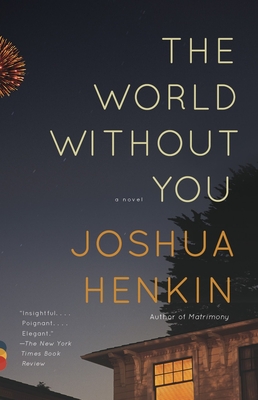We can’t stop ourselves from going, but is there anything more emotionally messed up than a gathering with your “family of origin?” It doesn’t matter how old you are or what you’ve done with your life since, you’re still a child – often a petulant, needy, easily hurt child – when you go back home, stay in your old room, and slide into that familiar give and take with parents and siblings.
Josh Henkin’s second novel was called Matrimony. His third one, The World Without You, starts off with a 44-year marriage that’s about to end, until its demise is postponed by the return of the extended family for a Fourth of July weekend in the Berkshires. Fireworks ensue.
I took a creative writing class from Josh once, and I remember a point he made about lifting a short story above mundane concerns. Quoting the Passover script, he said, “Why is this night different from all other nights?” He meant what’s at stake here? What’s urgent about it?
For the Frankel family, this Fourth of July holiday also serves as a memorial for the fourth child and only son, a reporter kidnapped and killed in Iraq the year before. Three older sisters, one widow, two husbands, a boyfriend, and a cluster of grandchildren join Mom and Dad to be together one more time. Old resentments meet new ones. Knee-jerk defensiveness parries every peace offering and once in a while there’s a deliberate stabbing, just to prove that cruelty can feel like love turned inside out. As one of the semi-outsiders notes, it’s a bit like being swallowed by a “many-tentacled beast.”
Be thankful, then, this is not your family, and be thankful that you get to spend this particular weekend with the Frankels, intimate witness to the simple wonder of human beings working it out with one another. Really, that’s what makes this novel special. Each character you meet is a vibrant being, dense with energy, and you get to know them and keep learning more about them all the way through – who they are, where they’ve come from, what they’re trying to be – even as you come to realize that “sibling” may be the fundamental unit of relationship and every other connection we try to form is just some twisted variation on that theme.
Another Hebrew expression shows up near the end, “Those who understand will understand.” Like a great play, there’s catharsis and consolation in experiencing these trials on stage. Suddenly the weekend is over, more quickly than you’ve expected, and you’re saying goodbye to the people who have marked you and formed you for good and bad, and you’re wishing that you weren’t. You’re left with that most painful of endings: You want more time with those you love.
-Keith Hollihan, author of The Four Stages of Cruelty


No comments:
Post a Comment